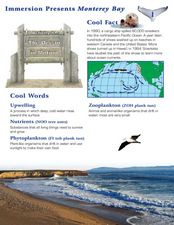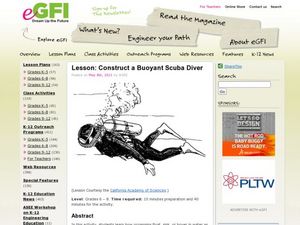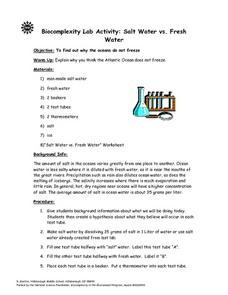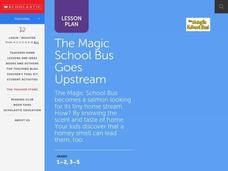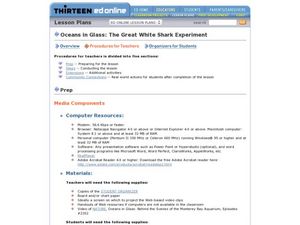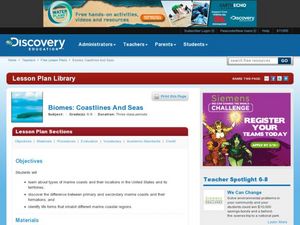Curated OER
Explore the Ocean
Learners explore the oceans from their origin. In this oceans lesson plan, students read and discuss excerpts from the Book of Genesis regarding the creation of the ocean. Learners then clean up a mock oil spill, measure the volume and...
Curated OER
Monterey Bay
Students read background information about Monterey Bay, California, and conduct related experiments. In this ocean in motion lesson, students read information about the location, wildlife, and characteristics of Monterey Bay. They...
Curated OER
Construct a Buoyant Scuba Diver
Groups of young oceanographers get to use action figures to experiment with the property of buoyancy! This memorable lesson plan provides detailed background information, a link to the laboratory worksheet, and thorough instruction...
Virginia Department of Education
Heat and Thermal Energy Transfer
How does radiation affect our daily lives? Answer that question and others with a lesson that discusses radiation and its use in thermal energy transfer through electromagnetic waves. Pupils investigate vaporization and...
Curated OER
Salt Water vs. Fresh Water
Young scholars explore why the oceans do not freeze. They explain why they think the Atlantic Ocean does not freeze. Students are given background information about what they are doing. They create a hypothesis about what they believe...
Curated OER
Tides - The Ins and Outs of Tides
Get your junior oceanographers to generate tidal prediction graphs on an interactive website. They will feel like experts in the field, or shall we say, experts in the ocean! This is a brief, but worthwhile activity that could be used to...
Curated OER
Plankton in the Air
Here is a lab activity adequate for use with any full lesson on environmental factors that shape animal adaptations or marine animal characteristics. Pupils will discuss the role plankton plays in the environment and filter-feeding...
Curated OER
Global Warming: Life in a Greenhouse
Young scholars examine the evidence that scientists have used to support the existence of global warming and the greenhouse effect. How the concepts have been developed and evaluated form the focus of this lesson.
Curated OER
Costa Rican Sea Turtles
Students read "One Tiny Turtle" by Nicola Davies. Using the internet, they research the characteristics of turtles off of the Costa Rica coast. In groups, they complete a worksheet and define vocabulary words they are unfamiliar with. ...
Curated OER
The Magic School Bus Goes Upstream
Students learn along with Ms. Frizzle's class. For this Magic School Bus lesson plan, students travel upstream to discover how, like salmon, a homey smell can lead them, too.
Curated OER
Ocean Exhibits
Ninth graders create an ocean museum. They work in partners to create their own exhibit. Each exhibit must have an interactive computer placard containing their information. The exhibits must also have a hands-on component.
NOAA
Mud is Mud...or is it?
We know that the type of soil varies by location, but does the seafloor sediment also vary, or is it all the same? Scholars compare photos of the seafloor from two different locations: the Savannah Scarp and the Charleston Bump. Through...
Curated OER
Round and Round
Learners interpret data from a three-dimensional array of current monitors to determine an overall pattern of water circulation. They hypothesize what effect an observed water circulation pattern might have on seamount fauna. A very...
Curated OER
Oceans in Glass: The Great White Shark Experiment
Young scholars use the Internet to study great white sharks and answer questions. In this ocean lesson students create and produce a website that summarizes the information they obtained in their research.
Curated OER
Sustainable Southern Belize: Coral Health Lesson Plan
Fifth graders investigate coral reefs and the dangers they face by labeling and drawing. In this oceanography lesson, 5th graders view a PowerPoint presentation of photographs of coral reefs in Belize. Students investigate...
Curated OER
Renewable vs. Non-Renewable Resources
Here's a fine lesson on renewable and non-renewable sources of energy for your 5th graders. In it, learners list a number of natural resources on the board, then try to sort the resources into appropriate categories. This helps them to...
Curated OER
Biomes: Coastlines and Seas
Students study the different types of coastlines and their territories. In this marine coasts lesson students identify life forms that are in the coastal regions.
Curated OER
Blue Planet: Frozen Seas
Students study the animals from the Arctic and how they have adapted. In this ocean lesson students create a poster about their given animal and present it to the class.
Curated OER
Rain On
Fourth graders study the water cycle and clouds. In this water cycle and cloud lesson plan, 4th graders determine the definition of condensation and watch a demonstration in which the teacher makes a cloud in a bottle. They discuss the...
Curated OER
Oceans-Coral Reefs
Second graders investigate coral reefs. In this oceanology lesson, 2nd graders discuss what constitutes a coral reef and the wildlife that lives there. Students watch a video about coral reefs and take an online quiz.
Curated OER
Activity 3: Using Photo Images to Explore Life on the Ocean Floor
Students work in groups with copies of the three photo images provided with the lesson. They make observations about mussels and clams. Students discuss reasons scientists use a representative sample of a population rather than the...
Curated OER
Lesson 4: Fighting for Peace: The Fate of Wilson's Fourteen Points
High schoolers analyze foreign policy. In this Fourteen Points lesson, students examine Wilson's Fourteen Points, explore Allied reaction to the Points, and compare Wilson's foreign policy to the Versailles Treaty.
Curated OER
Sea-ing More Clearly
Learners explore historical importance of fish as food source, examine works of Robert Harris, create their own fish, and compose accompanying poetry. Students then explore dramatic tradition of Chorus inspired by Greek theatre,...
Curated OER
Lesson Six
Students examine the ocean and its vast resources. In this oceans instructional activity students complete a "seaweed candy" activity then eat their creation.
Other popular searches
- Math Lessons on Oceans
- Pre K Lessons on Oceans
- Prue K Lessons on Oceans
- Drama Lessons on Oceans
- Pr K Lessons on Oceans

